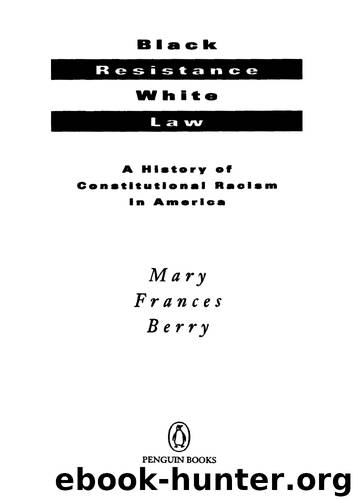Black Resistance White Law: A History of Constitutional Racism in America by Mary Frances Berry

Author:Mary Frances Berry [Berry, Mary Frances]
Language: eng
Format: epub, azw3
Publisher: Penguin Books
Published: 1995-01-31T16:00:00+00:00
15
Riots,
Rebellion, and
Repression
IN THE LAST HALF of the 1960s, the national government was faced with an expanded, but significantly transformed, black liberation movement. Black and white “togetherness” was challenged by black activists who recognized violence as one tactic for achieving their goals and whose thinking was greatly influenced by cultural black nationalism. In reflecting on his actions as assistant attorney general for civil rights in the Kennedy administration, Burke Marshall explained that his behavior and the FBI’s, which he considered justified in the name of federalism, caused a loss of faith in law among “Negro and white civil rights workers. The consequences in the future cannot be foreseen.”1
The tepid federal response to the assault and murder of civil rights workers engaged in nonviolent activities fomented distrust. Martin Luther King’s assassination made even nonviolence as a strategy seem ridiculous to some activists. The agreement of white liberals to the rejection of Fannie Lou Hamer and the Mississippi Freedom Democratic Party delegates in favor of a regular delegation of white racists completed the alienation of many black civil rights workers. Black activists began to think of economic and social revolution, of black power, and of forging alliances with white radicals and with nonwhite people in developing nations as a means for gaining equality of opportunity in American society. The black masses continued to lash out at “whitey” through his person and his ghetto property, while some militants devised plans and projects to move African-Americans from reform to revolution.2
Successive presidents turned their attention to constitutional means of suppressing rebellious black masses and supporting state and local law enforcement, while searching for a means to meet the needs or thwart the anger of hostile African-Americans, without too much change in the social and economic status quo. Congress, even as it put the finishing touches on civil rights legislation, was perplexed by the new problems arising out of the violence perpetrated by blacks who seemed ungrateful for congressional beneficence.
Joblessness, bad housing, bad education led to despair that festered in poor African-American communities. However, the surface issue that most often sparked violence and retaliatory repression by the federal government in the 1960s was police brutality. African-Americans had complained about police harassment for generations. In many of the incidents leading to riots, police action was a precipitant. In 1959, Robert F. Williams, then director of the Monroe, North Carolina, branch of the NAACP, asserted that African-Americans should respond violently when attacked by whites, since justice could not be expected in local court systems. His caustic expression of bitter disillusion reflected the verdicts of a local county court which handed an acquittal to two white men accused of brutally assaulting two black women but gave a jail sentence to a mentally retarded black man for having had an argument with a white woman. Williams asserted that African-Americans must understand that a liberation struggle had to be flexible; there was a place for violence as well as nonviolence. In August of 1961, during an outbreak of racial violence in Monroe, Williams was falsely accused of kidnapping a white couple.
Download
Black Resistance White Law: A History of Constitutional Racism in America by Mary Frances Berry.azw3
This site does not store any files on its server. We only index and link to content provided by other sites. Please contact the content providers to delete copyright contents if any and email us, we'll remove relevant links or contents immediately.
| General | Discrimination & Racism |
Nudge - Improving Decisions about Health, Wealth, and Happiness by Thaler Sunstein(7706)
The Fire Next Time by James Baldwin(5444)
iGen by Jean M. Twenge(5415)
Adulting by Kelly Williams Brown(4574)
The Sports Rules Book by Human Kinetics(4386)
The Hacking of the American Mind by Robert H. Lustig(4383)
The Ethical Slut by Janet W. Hardy(4251)
Captivate by Vanessa Van Edwards(3839)
Mummy Knew by Lisa James(3691)
In a Sunburned Country by Bill Bryson(3542)
The Worm at the Core by Sheldon Solomon(3487)
Ants Among Elephants by Sujatha Gidla(3467)
The 48 laws of power by Robert Greene & Joost Elffers(3291)
Suicide: A Study in Sociology by Emile Durkheim(3022)
The Slow Fix: Solve Problems, Work Smarter, and Live Better In a World Addicted to Speed by Carl Honore(3009)
The Tipping Point by Malcolm Gladwell(2921)
Humans of New York by Brandon Stanton(2873)
Get What's Yours for Medicare: Maximize Your Coverage, Minimize Your Costs by Philip Moeller(2730)
Handbook of Forensic Sociology and Psychology by Stephen J. Morewitz & Mark L. Goldstein(2705)
